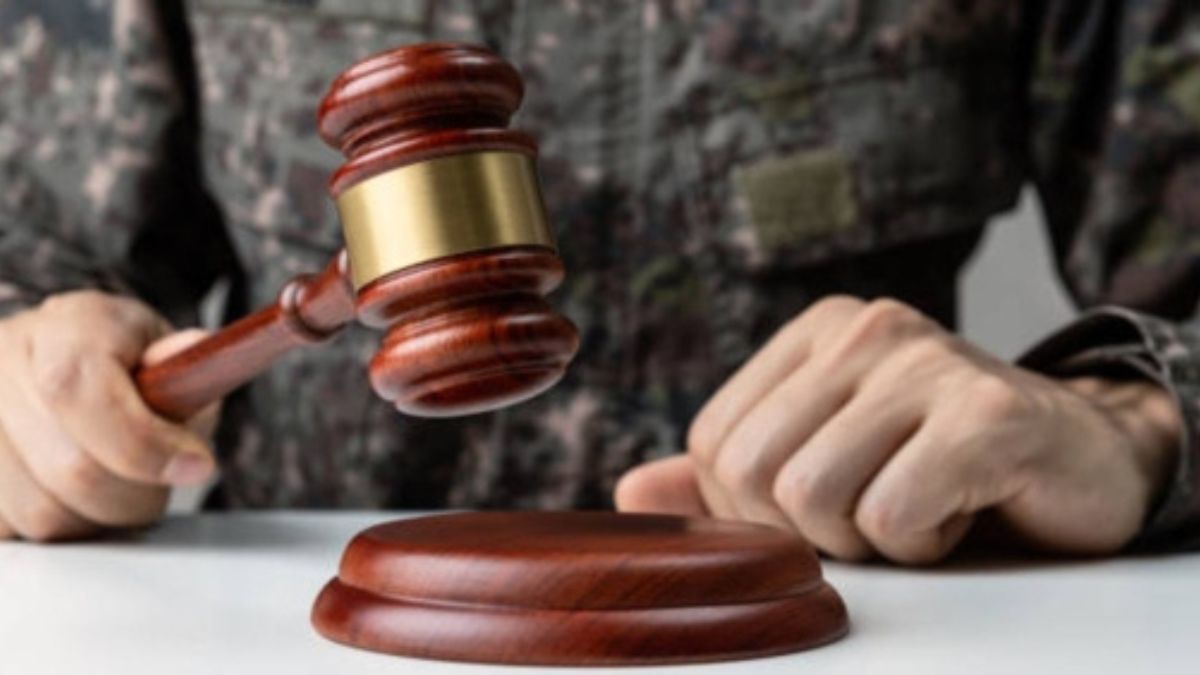LAW
Defending Your Rights: The Essential Role of Criminal Defense Attorneys

In a society governed by laws, being accused of a crime can be a distressing, life-altering experience. With your freedom, reputation, and future on the line, it is essential to have someone in your corner who can protect your rights and ensure you receive a fair trial.
This is where criminal defense attorneys come in, such as DRK Attorneys. They play a vital role in the justice system, defending individuals accused of criminal offenses and advocating for their rights at every step of the legal process. In this blog post, we’ll discuss the role of criminal defense attorneys and how they can help those facing criminal charges.
Protecting Clients’ Constitutional Rights
Criminal defense attorneys are responsible for ensuring that their clients receive a fair trial and that the government complies with the law. Specifically, criminal defense attorneys work to protect their clients’ rights to due process, a fair trial, and protection against self-incrimination. They also ensure that any evidence obtained by law enforcement is obtained lawfully and within the bounds of the Constitution.
This critical work ensures that the justice system operates fairly and that individuals are not wrongly convicted or subjected to unconstitutional treatment. Without criminal defense attorneys, individuals facing criminal charges would be at risk of having their rights violated and facing unjust consequences.
Ensuring Fair Treatment in Court
Criminal defense attorneys play an essential role in upholding this principle by advocating for their clients’ rights and working to ensure that all aspects of the legal process are carried out in a fair and just manner. Whether it’s challenging evidence, negotiating plea deals, or representing their clients in court, criminal defense attorneys work tirelessly to ensure that their clients receive a fair trial.
This is especially important for individuals who may be facing criminal charges for the first time or those who may not have access to the same resources and expertise as the prosecution. By defending the rights of their clients, criminal defense attorneys help to uphold the integrity of the legal system and promote justice for all.
Investigating Evidence and Witnesses Thoroughly
One of the key responsibilities of a defense attorney is to investigate the evidence and witnesses thoroughly. This requires a meticulous approach to analyzing all available information, including police reports, witness statements, and any physical evidence. Defense attorneys must also utilize their knowledge of the law to identify any potential legal defenses or weaknesses in the prosecution’s case.
By conducting a thorough investigation, defense attorneys can uncover important facts and evidence that can be used to challenge the prosecution’s case and potentially lead to a favorable outcome for their client. The ability to investigate evidence and witnesses thoroughly is an essential skill for any criminal defense attorney, and it is critical to ensuring that justice is served.
Building Strong Defense Strategies
Criminal cases can be complex and challenging, often involving evidence that may be circumstantial, incomplete, or unreliable. To effectively defend their clients, attorneys must carefully analyze all available evidence, identify any weaknesses in the prosecution’s case, and develop strategies to challenge the evidence presented against their clients. This requires a deep understanding of the legal system, as well as the ability to think creatively and strategically to present a compelling case in court.
A skilled criminal defense attorney will work tirelessly to protect the rights of their clients and ensure that they receive a fair trial, regardless of the charges they face. Building strong defense strategies is a critical aspect of this work and one that can make all the difference in achieving a positive outcome for those accused of crimes.
Negotiating Plea Bargains When Appropriate
A plea bargain is an agreement between the prosecutor and defendant in which the defendant agrees to plead guilty to a lesser charge or to a reduced sentence in exchange for avoiding a trial. Negotiating plea bargains can be a complex process that involves a thorough understanding of the law, the facts of the case, and the needs and desires of both the defendant and the prosecutor. Experienced criminal defense attorneys are skilled negotiators who can work with prosecutors to secure favorable plea bargains for their clients.
However, it is important to note that not all cases are appropriate for plea bargaining. In some cases, it may be in the defendant’s best interest to proceed with a trial. It is the responsibility of the criminal defense attorney to carefully evaluate each case and advise their client on the best course of action.
Advocating for Reduced Sentences
This can be achieved through various legal strategies, including plea bargaining, sentence mitigation, and sentence reduction motions. The goal of advocating for reduced sentences is to minimize the negative impact of a criminal conviction on the defendant’s life, including their personal and professional reputation, finances, and freedom.
A skilled criminal defense attorney will have a thorough understanding of the legal system and the various factors that can influence sentencing outcomes, such as the defendant’s criminal history, the nature of the offense, and the jurisdiction where the case is being tried. By advocating for reduced sentences, criminal defense attorneys play a critical role in ensuring that justice is served and that defendants are treated fairly under the law.
Providing Counsel Throughout Legal Process
One essential task that they undertake is providing counsel throughout the legal process. This involves advising their clients on the best course of action to take at every stage of the proceedings, from arrest and interrogation to trial and sentencing. Criminal defense attorneys also work closely with their clients to develop a comprehensive legal strategy, which includes investigating the case, researching relevant laws, and assessing the strength of the prosecution’s case.
Furthermore, they ensure that their clients fully understand the charges against them and the potential consequences of each legal option. By providing comprehensive counsel, criminal defense attorneys empower their clients to make informed decisions throughout the legal process and increase their chances of achieving a favorable outcome.
Upholding Justice for All Individuals
The legal system is designed to ensure that every person is presumed innocent until proven guilty, and it is the responsibility of criminal defense attorneys to ensure that this principle is upheld for their clients. By providing competent and zealous representation, criminal defense attorneys help to ensure that their clients receive fair treatment and that their rights are protected throughout the legal process.
This includes challenging evidence that may be improperly obtained, advocating for lesser charges or reduced sentences, and ensuring that their clients receive a fair trial. Upholding justice for all individuals is a fundamental principle that lies at the heart of the criminal justice system, and criminal defense attorneys play a critical role in ensuring that this principle is upheld.
Conclusion
Criminal defense attorneys play an essential role in protecting the rights of individuals facing criminal charges. They ensure that every person, regardless of their circumstances, receives a fair and just legal process. The challenges and complexities of criminal cases require the skills, knowledge, and experience of a knowledgeable defense attorney.
It is crucial to understand the value of these legal professionals and to seek their assistance if you or a loved one is facing criminal charges. In the end, a criminal defense attorney is a powerful advocates for their clients, fighting tirelessly to protect their rights and secure the best possible outcome in their case.
LAW
Can I Move Out Of State With My Child After Divorce?

After a divorce, the thought of moving to another state with your child might bring a mix of hope and anxiety. You want what’s best for your child, but the legal waters can feel murky. Making such a move without following proper procedures can lead to complicated legal challenges. Before packing your bags, it’s important to understand the legal steps required. Each state has specific rules about relocating with a child after a divorce. Courts focus on what serves the child best. They examine factors like the child’s relationship with both parents, educational needs, and emotional well-being. You must present a compelling case for the move. Consulting with a Mount Pleasant Divorce Attorney can offer guidance tailored to your situation. They can help you understand your rights and craft a plan that aligns with legal standards. This ensures you fulfill your child’s needs while respecting legal requirements.
Understanding Legal Considerations
Before making any plans, it is crucial to understand the legal framework that governs such moves. Laws differ from state to state, but generally, they share a focus on the child’s best interests. Most jurisdictions require the custodial parent to notify or seek permission from the non-custodial parent or the court before relocating.
For a successful petition, you need to clearly state the reasons for the move. Common reasons include better job opportunities, proximity to extended family, or improved educational settings for the child. However, the court may require more than just a verbal explanation. You should prepare evidence to support your reasons.
Factors Considered by Courts
When deciding on relocation, courts review several factors:
- The child’s bond with each parent
- Educational opportunities in the new location
- The potential impact on the child’s emotional well-being
These factors help the court decide if the move benefits the child overall. The court’s decision will balance the child’s emotional health, educational needs, and relationships with both parents.
Creating a Viable Plan
To strengthen your case, create a detailed plan that addresses the following:
- Proposed visitation schedule for the non-custodial parent
- Transportation arrangements for the child
- Communication methods to maintain the parent-child bond
Presenting a well-thought-out plan shows the court your commitment to maintaining the child’s relationship with the other parent. It demonstrates responsibility and foresight.
State-Specific Laws
Each state has its own set of rules governing child relocation. Below is a comparison table highlighting the differences:
| State | Notification Required | Approval Needed |
| California | Yes | Court approval if contested |
| Texas | Yes, typically 60 days prior | Yes, if contested |
| New York | Yes | Yes, if contested |
Always check the specific laws in your state before proceeding. You can find more information on state-by-state laws by visiting the National Conference of State Legislatures.
Seeking Professional Guidance
Legal processes can be overwhelming. Enlisting the help of a qualified attorney can ease the stress. They can offer insights into your state’s specific procedures and help you prepare your case. A legal advisor can also guide you on what evidence to gather and how to present your case to make a compelling argument.
For further reading on child custody and relocation laws, you can consult the American Bar Association. They provide comprehensive resources on family law, including child relocation cases.
Conclusion
Relocating with a child after divorce involves more than just moving boxes. It requires a careful balance of legal responsibilities and the child’s well-being. Understanding the legal steps and preparing a comprehensive plan can pave the way for a smoother transition. Remember, the goal is to ensure the best possible outcome for your child, while respecting all legal obligations. Focusing on these elements will help you make informed decisions, providing peace and stability for both you and your child.
LAW
How Much Does A Divorce Cost

Navigating a divorce can be emotionally challenging. Understanding the costs involved eases some of that burden. Divorce expenses vary widely. Legal fees play a big role, but many factors affect the total cost. From filing fees to mediation expenses, knowing what to expect helps you prepare. Wood Cross Divorce Attorneys can provide guidance on these expenses. It’s crucial to consider all potential costs upfront. Legal representation, court fees, and possibly child custody evaluations contribute to the total. Familiarize yourself with these elements to manage expectations. When prepared, you can focus on the significant life changes ahead. Remember, divorce is a process with many layers. Accurate knowledge reduces stress and financial surprises. By shedding light on these costs, you make informed decisions. This understanding leads to better financial planning during a difficult time. Facing the unknown is always daunting. Take control with clear information about divorce expenses.
Basic Divorce Costs
The basic costs of divorce include filing fees and court fees. These are necessary expenses for anyone seeking a divorce. Filing fees differ by state. Expect to pay anywhere from $100 to $400. Some states also charge additional fees for processing paperwork. Court fees can add another layer of expense if your case goes to trial.
Consider using mediation. Mediation fees range from $100 to $300 per hour. While this might seem costly, mediation often saves money in the long run by avoiding long court battles. Mediation also allows for more amicable solutions.
Legal Representation
Legal fees are often the most significant expense. Hiring a lawyer provides expertise and can ease the divorce process. Most lawyers charge by the hour, with rates varying between $150 and $500. The complexity of your case and the experience of your lawyer influence the total cost.
Some lawyers offer flat fees for uncontested divorces. This can be a more affordable option if you and your spouse agree on major issues. For more guidance, consult the United States Courts for an overview of fee schedules.
Additional Costs
Beyond basic and legal fees, other expenses may arise. Child custody evaluations can cost several thousand dollars. These evaluations include interviews, home visits, and psychological tests. They help determine the best interests of the child, but they add to the financial burden.
Property appraisals and financial analyses are sometimes needed. These services assess the value of shared assets and liabilities. Costs vary depending on the complexity and number of assets involved.
Estimated Divorce Costs Table
| Expense | Estimated Cost |
| Filing Fees | $100 – $400 |
| Mediation | $100 – $300 per hour |
| Legal Fees | $150 – $500 per hour |
| Child Custody Evaluation | $1,000 – $5,000 |
| Property Appraisal | $300 – $1,500 |
| Financial Analysis | $1,000 – $3,000 |
Cost-Saving Tips
To manage divorce costs, consider the following tips. First, opt for uncontested divorce if possible. This reduces both time and legal fees. Next, use mediation to agree on various issues. This method is often quicker and more amicable.
Limit communication with your lawyer to essential matters. Every phone call or email could add to your bill. Also, gather and organize your financial documents. This preparation saves time and reduces legal fees.
Conclusion
Understanding the costs involved in a divorce helps you plan and reduces stress. Legal fees, filing costs, and additional evaluations contribute to the total expense. Explore options like mediation and uncontested divorce to keep costs manageable. For more information, visit Purdue University’s guide on divorce costs. Remember, being well-informed leads to better financial planning during this challenging time.
LAW
What To Do If You’re Accused Of Espionage Or Treason As A Service Member

Facing accusations of espionage or treason can be overwhelming. You might feel isolated and unsure of your next steps. But remember, you’re not alone. Here’s what to do if you’re accused of espionage or treason as a service member. First, stay calm and gather your thoughts. Panic will not help you. Next, immediately seek military legal help. It’s crucial to have a knowledgeable guide through this process. You need someone who understands the military justice system. Communicate honestly with your legal advisor. They’re your advocate, there to help you. Also, refrain from discussing details with others. This protects you from misunderstandings or further allegations. Maintain your routine as much as possible to stay grounded. Pay attention to any legal paperwork you receive and comply with deadlines. Remember that there is a way through this situation. Reach out for help and stay focused on navigating this challenge.
Understanding the Accusation
It’s important to understand the nature of the charges against you. Espionage involves sharing or attempting to share information with foreign entities. Treason, a grave accusation, involves actions against your own nation. Both carry severe consequences. Knowing these differences helps you communicate effectively with your legal team.
Legal Representation
Your choice of legal help is vital. A military attorney familiar with the Uniform Code of Military Justice (UCMJ) will provide the best assistance. They will navigate the complex legal proceedings and ensure your rights are safeguarded. Be open and honest with them to create a strong defense.
Maintaining Composure
During investigations, maintaining composure is essential. Avoid confrontations and focus on cooperating with legal processes. This shows your commitment to resolving the accusations and upholding integrity.
Sample Consequences of Accusations
| Accusation | Potential Consequences |
| Espionage | Dishonorable discharge, imprisonment |
| Treason | Life imprisonment, fines |
Support Systems
Leverage the support available to you. Aside from legal help, consider reaching out to family, trusted friends, or support groups. The backing of loved ones can provide comfort and strength during difficult times.
Focus on Evidence
Gather any evidence that supports your case. This can include communication records, witness statements, or any documentation disproving the allegations. Share these with your attorney to build a robust defense strategy.
Be Aware of Rights
Understand your rights as a service member. You have the right to remain silent, the right to legal representation, and the right to a fair trial. Use these rights wisely to protect yourself during legal proceedings.
Conclusion
Accusations of espionage or treason are serious and can have long-lasting implications. However, with the right approach and support, you can navigate this challenging period. Remember, staying calm and focused is crucial. Seek military legal help as a priority and maintain honest communication with your legal team. Protect your rights and work towards presenting a strong defense. Rely on your support network to provide emotional strength. With diligent preparation and guidance, you can overcome these accusations and emerge with your integrity intact.
-

 FASHION11 months ago
FASHION11 months agoElegant Winter Party Style: Trendy Long-Sleeve Dresses and Essential Hair Care Tips
-

 HOME11 months ago
HOME11 months agoThe Impact of thejavasea.me Leaks AIO-TLP Users: A Comprehensive Guide
-

 BUSINESS10 months ago
BUSINESS10 months agoHOW TO SHOP GOODWILL OUTLET STORE
-

 SKINCARE&BEAUTY5 months ago
SKINCARE&BEAUTY5 months agoCeylan Eye Cream Reviews: Real Results from Real Users
-

 HOME5 months ago
HOME5 months agoTributePrintedPics Review: A Deep Dive into Quality, Design, and Customer Experience
-

 CULTURE5 months ago
CULTURE5 months agoUncuymaza Unveiled: The Cultural Significance Behind the Craft
-

 LIFESTYLE4 months ago
LIFESTYLE4 months agoDiscovering Luuxly.com: Your Ultimate Guide to Luxury Lifestyle
-

 TECHNOLOGY5 months ago
TECHNOLOGY5 months agoztec100.com: Your Ultimate Guide to Cutting-Edge Tech Solutions
